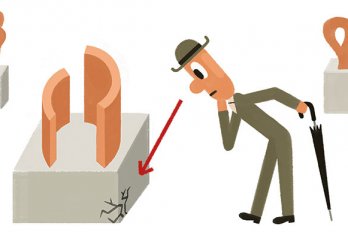This past June 18, sixteen Canadian politicians received hand-delivered envelopes, containing a few dozen grams of what looked to be chrysotile asbestos—their reward for failing to take a stand against Canada’s asbestos export industry. Just five days earlier, the Vancouver organization TruthFool, building on a campaign known as Canada Causes Cancer, had called for constituents of Conservative ridings to deliver this “message” to their Members of Parliament. As activism goes, it was a modest gesture. But it left its targets with an interesting dilemma: What to do with the stuff. Throw it in the garbage? Dump it down the drain? Wash their hands? If the MPs didn’t want it near them, they would have to wonder, why are we sending it overseas?
If this scene strikes you as farcical, it is. The campaign’s organizers were not petty hooligans, tree-hugging hippies, or dour environmental academics; they were comedians. The asbestos messengers were called to action by a funny video.
Before he became an activist, TruthFool’s head honcho, Sean Devlin, was a stand-up comedian. Diminutive and soft spoken, the half-Irish, half-Filipino Ottawan grew up funny, but too shy to tell jokes. Instead, he passed them, Cyrano-style, through a friend. (“He got very popular that year,” Devlin deadpans.) It wasn’t until he moved to Vancouver as a young adult that he gathered the courage to start performing regularly—“Literally, the first thing I did when I arrived was find a comedy club,” he says—and he spent the next five years honing his act, an absurdist, monotone ramble that delighted in its weirdness.
Biting Words
Satire wasn’t always funny
Luc Melanson
Satire and comedy were once considered very different things. Aristotle thought comedy made it “possible to satisfy the emotions in due measure, and, by satisfying them, to keep them tractable for education.” Laughter, in other words, made it possible to get serious. Translators of his works, such as the seventh-century scholar Isidore, interpreted comedy as “the treatment of light and cheerful events” whose “primary aim was to amuse.” In AD 932, during Islam’s golden age, scholar Abu Bishr made the earliest Arabic translation of the Poetics, in which he rendered the Greek word comoedia as hijā, equating comedy with an Arabic literary device whose name means, roughly, “satirical composition,” or a harsh criticism of vice and folly. A pupil of Bishr’s, the early medieval scholar Al-Farabi, interpreted comedy as the mention of “blameworthy characteristics and reprehensible habits.” The conflation of critique and humour continued with the eleventh-century works of Avicenna, and Averroës in the mid–twelfth century. Similarly, nowadays we are as likely to turn to Jon Stewart for political rhetoric as for laughs.
—Amirah El-Safty
His former girlfriend, Annie Guerin, opened his eyes to local and international issues, and a few years ago he joined her for six months in Ghana, where they tutored children. On his return, “I felt like comedy wasn’t important enough,” he says, “which maybe seems judgmental. But I felt guilty. If I was thinking about how to write a joke, it seemed like a waste of time.” So he began incorporating activism into his routine, shoehorning his concerns into his act. It made audiences uncomfortable; once, for example, he pivoted from a joke about a friend’s birthday gift to a discussion of sweatshop labour, a bait and switch not unlike promising ice cream and delivering sardines in a cone.
Friends, however, visited him after his sets to tell him that they shared his views, even if a comedy show wasn’t the right venue for them. There was something to it, in other words, but he couldn’t articulate what until he discovered The Emerging Millennials, by University of Lethbridge sociologist Reginald Bibby, who has spent the past four decades documenting Canada’s youngest generation. He found that Millennials eschew many of the values—hard work, politeness, intelligence, cleanliness—that previous generations lived by (“Essentially, when your grandpa says, ‘Kids these days,’ he’s right,” says Devlin). However, they care deeply about their friends, and they share a concern for strangers that their predecessors did not. Blame a “boomer echo,” in which Millennials’ hippie parents pass down their smile-on-your-brother ethos; or blame the Internet, which enables us to empathize instantly with people who live continents away—but there you have it.
Most importantly, Bibby found that Millennials placed one value above all others: humour. Devlin links this to a quote by English playwright Christopher Fry: “Comedy is an escape, not from truth but despair; a narrow escape into faith.” Comedy, far from being frivolous, provides a way for us to project our hopes onto increasingly complex issues. “Our generation is presented as being so apathetic, but it’s not that we don’t care,” Devlin says. “It’s that these problems are so overwhelming that tuning them out is an act of self-defence.” Similar to the folk music of the ’30s and ’60s, comedy is the dial that allows us to tune in to weighty issues without hearing the depressing static, to access information without being crippled by statistics. In Bibby and Fry, Devlin had found his modus operandi—not just to raise these issues within comedy, but to use comedy as the medium for the message.
Last November, he started TruthFool, a communications consultancy run by a small group of passionate and media-savvy Vancouverites. “We think of ourselves as a good guy think tank,” he says. In their brief history, they’ve worked on nearly a dozen campaigns—including one for the BC Poverty Reduction Coalition and another for Climate Action Network Canada—creating short, punchy, straight-to-viral videos and engaging a demographic that’s impervious to the old activist values. “Many of these organizations and activists have become bogged down with scientific, data-based ways of communicating problems,” he says. “They fail to communicate the injustice.”
This is the kernel of TruthFool’s unique methodology: boil it down. During the 2011 federal election, they started a website called shitharperdid.ca, detailing the PM’s record in easy-to-tweet zingers and videos, each squeezing a Harperism into a comedic diamond. Within seventy-two hours, the site received more than 4.1 million hits, along with endorsements by the likes of Margaret Atwood and actress Ellen Page. For Canada Causes Cancer, which is backed by CUPE, TruthFool created a video series in which interior design guru Crystal Tile (get it?) demonstrates using asbestos in the home—while taking care to leave the actual handling to her Indian and Filipino friends. Visitors to canadacausescancer.ca can sign a petition that goes straight to their MPs. Soon, TruthFool plans to translate the site into Hindi, Punjabi, and Tagalog—languages spoken in the countries most affected by our asbestos exports.
“Getting public attention is difficult,” says Nathan Cullen, the NDP MP for Skeena-Bulkley Valley, British Columbia, who this fall will table a private member’s bill seeking an asbestos ban and a transition for the industry’s remaining workers. TruthFool will help on the messaging front. “You’d think with [the Internet] it would get easier, but it’s just a more crowded field, says Cullen. “[Comedy is] different. It destabilizes the traditional power sources, and makes change possible from sources that previously didn’t have access to power.”
As of this writing, TruthFool is gearing up to work on Vancouver’s civic election campaign; the Ontario provincial election (with various groups, on issues from wage equality to helping working families); and Greenpeace’s planned opposition of the tar sands—a massive, headline-ready civil disobedience initiative for which they will handle comedic calls to arms. “[NGOs] and other groups will approach something like this by trying to be funny, which doesn’t work, because they’re not comedians,” Devlin says. “TruthFool works on the reverse principle: not activists becoming comedians, but comedians becoming activists.”
This appeared in the November 2011 issue.






